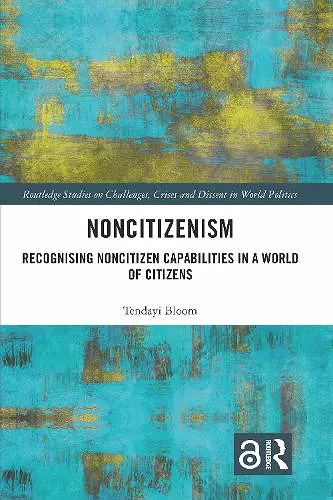Noncitizenism
Recognising Noncitizen Capabilities in a World of Citizens
Format:Hardback
Publisher:Taylor & Francis Ltd
Published:2nd Nov '17
Currently unavailable, and unfortunately no date known when it will be back
This hardback is available in another edition too:
- Paperback£43.99(9780367888800)

Noncitizens have always been present in liberal political philosophy. Often hard to situate within traditional frameworks that prioritise citizenship, noncitizens can appear voiceless and rightsless, which has implications for efforts towards global justice and justice in migration. This book proposes an alternative.
Noncitizenism identifies an analytical category of noncitizenship. While maintaining the importance of citizenship, noncitizenship is another form of special individual-State relationship. It operates far from a State, at its borders, and within its territory, providing a tool for examining the continuity between sites of engagement and the literatures, questions, and conclusions relating to them. The book argues that an accurate liberal theoretical framework, and one which can address contemporary challenges, must acknowledge the political relationship of noncitizenship between individuals and States.
This book is for students and scholars of political philosophy and for those interested in noncitizenship and how it can inform the response of liberal theory, citizenship, global justice, migration studies, political theory and policy work.
‘It takes a bold thinker to introduce a new term into the thicket of contemporary discussions of citizenship, migration and belonging. Tendayi Bloom does this with her ambitious concept of noncitzenism. She presents noncitizenship as a unifying analytic category that describes a particular relationship between individuals and States. Her claim is that the relationship deserves attention because of its special consequences for the rights of affected individuals, irrespective of their particular type of noncitizenship. Cogently argued and lucidly written, this impressive book is both a valuable addition to the literature on one of the major political challenges of our times, and a stimulating provocation for constituencies actively engaged in contesting the many injustices it describes.’ - Jacqueline Bhabha, Harvard University, USA.
‘By documenting critical social movements this book illustrates how the rights of noncitizens are being constituted as a site of political struggle. It is a brilliant book that restores political agency to noncitizens in (liberal) theory – something that states resist in (illiberal) practices.’ — Engin Isin, Queen Mary University of London, UK.
‘This book is a timely challenge to ‘methodological citizenism’ – the assumption that all political thinking has to be structured around citizenship. Against this, it poses the idea of noncitizenship, rather than non-citizenship. Drawing on a wide range of resources, it points the way forward, offering a vision of what liberal theory and practice could look like if they were to break out of the state-citizen relationship. And it stands as an urgent warning that, if they are to remain relevant to the project of social justice, then they must embrace the category of the noncitizen as an essential part of the liberal framework. It is essential reading for anybody concerned with the contradictions of national membership and global just
ISBN: 9781138049185
Dimensions: unknown
Weight: 380g
222 pages